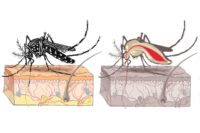
While the pun is intended, the virus itself is no joke. Dr. Satish Pillai, deputy incident manager for CDC’s Zika response team, and Jill Shugart, assistant program coordinator for emergency preparedness and response at NIOSH, conducted the webinar that highlighted ways Zika can be transmitted.
According to Safety + Health Magazine, there is no vaccine yet for the Zika virus. Zika facts of note:
- It is most commonly transmitted through the bite of an infected species of mosquito.
- The virus also has been transmitted through sexual activity among humans, during blood transfusions or via laboratory exposures such as a needlestick.
- An infection from the virus in pregnant women has been linked to severe birth defects, including microcephaly.
- The virus has been prevalent in South and Central America and the Caribbean but has been reported in other parts of the world. However, no* Zika-infected mosquitoes have been found in North America*. (*Editor’s Note: CDC Arboviral Disease Branch as of August 10 reports 6 locally acquired mosquito-borne cases in the U.S. with 1,955 travel-associated cases reported)
- About 80 percent of cases show few or mild symptoms. The most common symptoms include fever, rash, conjunctivitis and joint pain.
- OSHA and NIOSH identified outdoor workers as being most at risk for exposure to Zika.
Pillai shared guidelines for outdoor workers during the webinar, including using outdoor insect repellent, wearing clothing treated with permethrin, being cognizant of standing water around a workplace, which is a breeding ground for insects, drinking plenty of water, taking rest breaks in shaded areas, and educating oneself on the facts of the Zika virus.
If an employer or worker suspects exposure to Zika, he or she should should visit a health care provider immediately.




Reader Interactions